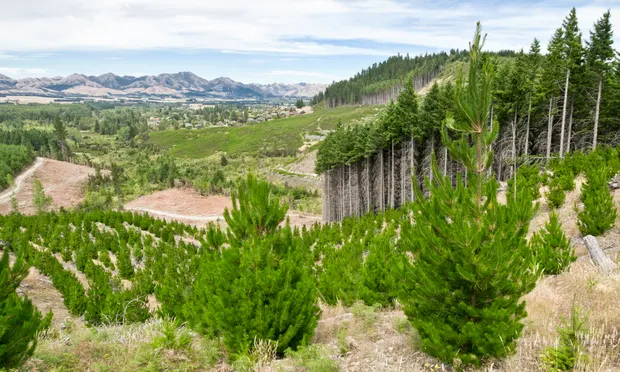A body advising the government on its climate policy direction has warned New Zealand that its heavy reliance on planting trees to offset carbon pollution threatens to torpedo the country’s ambitious plans to reach net zero emissions by 2050.
The independent Climate Commission published draft guidance on Wednesday that – when finalised later this year – must be considered by New Zealand’s leaders as they draw up their next suite of plans to meet the country’s greenhouse gas reduction targets.
Among other things, the provisional document sounded the renewed alarm about the government’s inclusion of carbon offsets through forestry in its calculation of emissions reduction and a lack of clarity on how many meetings climate goals should be made up of real cuts to high-polluting activities.
According to the body, New Zealand’s government “needs to make a choice about how far it will go” in directly cutting polluting activities versus simply planting trees to remove carbon. If it fails to do this, it is expected that the country would fail to reach net zero emissions by 2050.
Read also: The Netherlands announces $31 billion in the drive to meet 2030 climate goals
“Our current pathway of policies will not get us there,” the chair of the commission, Rod Carr said.
His remarks struck a cautious note a year after New Zealand’s Labour government unveiled the most sweeping and ambitious plan to reduce emissions in the country’s history, with a policy programme that included dozens of proposed actions.
In her reaction, Jacinda Ardern, then New Zealand’s prime minister, said when she announced the plan – which was also based on the Commission’s advice – that the climate crisis was a matter of “life or death”. A law passed by her government enshrines in law the target of net zero emissions and a reduction in biogenic methane emissions by 24%-47% by 2050.
Reports show that New Zealand has built a global brand through its presentation as a “clean, green” paradise. But while the agricultural country of 5 million’s share of global greenhouse gas emissions is small, its gross emissions per capita are high and it has been one of the world’s worst performers on emission increases.
Emissions in New Zealand rose 57% between 1990 and 2018 – the second-greatest increase of all industrialised countries. Chris Hipkins, who replaced Ardern as prime minister in January, is reported to have also rolled back a raft of climate change policies as he focuses on “bread and butter issues” ahead of October’s general election.
Story was adapted from the Guardian.
